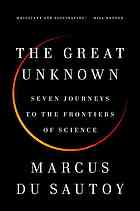
The Great Unknown
Seven Journeys to the Frontiers of Science
کتاب های مرتبط
- اطلاعات
- نقد و بررسی
- دیدگاه کاربران
نقد و بررسی

Starred review from February 20, 2017
With uncommon grace, this work illuminates the strides and limitations of humans’ quest to understand nature via math and science. Du Sautoy (The Music of the Primes), Simonyi Professor for the Public Understanding of Science at Oxford, takes readers to seven different “edges” of knowledge and shows why “Newton, Leibniz, and Galileo were perhaps the last scientists to know all that was known.” From chaos, which “placed huge limits on what we humans could ever hope to know,” to consciousness, to infinity itself, each edge “represents a horizon beyond which we cannot see.” Patiently and cleverly explaining basic principles, du Sautoy begins most sections with a simple touchstone and builds from there, deftly rendering otherwise recondite theories: a pair of dice leads to probability, a cello to the nature of matter, a pot of uranium to quantum physics. One-on-one interviews with scientists and du Sautoy’s descriptions of his participation in various experiments breathe life into cold data, as when the author perceives his consciousness in another person or observes the illusion of his free will in an fMRI. This brilliant, well-written exploration of our universe’s biggest mysteries will captivate the curious and leave them pondering “natural phenomena that will never be tamed and known.” Agent: Zoë Pagnamenta, Zoë Pagnamenta Agency.

Starred review from March 1, 2017
Are there limits to human knowledge? Philosophers and religious thinkers have long answered "yes" and then provided examples that turned out to be wrong. A renowned mathematician argues that "yes" might very well be correct.Du Sautoy (Public Understanding of Science/Oxford Univ.; The Number Mysteries: A Mathematical Odyssey through Everyday Life, 2011, etc.) sets himself a difficult task: "to know whether there are things that, by their very nature, we will never know." He asks, "despite the marauding pace of scientific advances, are there things that will remain beyond the reach of even the greatest scientists, mysteries that will remain forever part of the great unknown?" Readers will thoroughly enjoy his successful effort, which avoids the pitfalls of predicting specifics by addressing general areas. Empty space cannot exist; it's impossible to know the simultaneous location and speed of anything; particles sometimes behave like pure energy. This is true of everything but becomes obvious at the level of atoms and smaller. It's called quantum mechanics, a murky subject that nobody understands fully. The most powerful computer can't forecast a traffic jam or the weather beyond a few weeks because a small change at the beginning may produce enormous, unpredictable changes later. This is chaos theory, an implacable barrier. Deconstructing time and determining the size of the universe remain out of reach, but the mechanism of consciousness, once the poster boy of impossibility, now seems the inevitable product of increasingly advanced studies in neuroscience. The author concludes with his own field, which, unlike science, can prove statements absolutely. Infinity, once considered beyond comprehension, turns out to be full of interesting qualities, and parallel lines often meet, but mathematicians have shown that many statements and entire areas of mathematics are unprovable.A delicious addition to the "Big Question" genre.
COPYRIGHT(2017) Kirkus Reviews, ALL RIGHTS RESERVED.

























دیدگاه کاربران